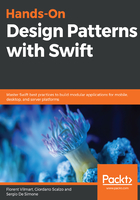
上QQ阅读APP看书,第一时间看更新
Generic enums
In the following example, we will build a fully generic light:
enum State<T>: Equatable where T: Equatable {
case on
case off
case dimmed(T)
}
struct Bits8Dimming: Equatable {
let value: Int
init(_ value: Int) {
assert(value > 0 && value < 256)
self.value = value
}
}
struct ZeroOneDimming: Equatable {
let value: Double
init(_ value: Double) {
assert(value > 0 && value < 1)
self.value = value
}
}
let nostalgiaState: State<Bits8Dimming> = .dimmed(.init(10))
let otherState: State<ZeroOneDimming> = .dimmed(.init(0.4))
The dim type is now specified as a part of the State type. This gives us a lot of flexibility, as well as validation. Wrapping the value into a small struct adds very little overhead in terms of performance, and allows us to ensure that the values are sane before being set into our enum.